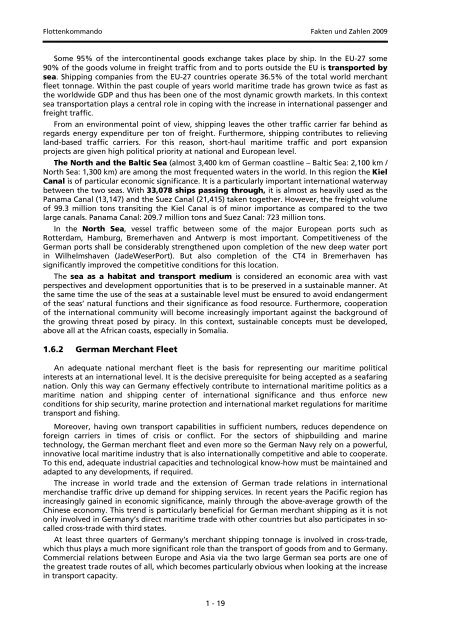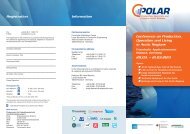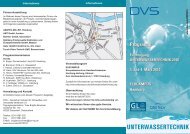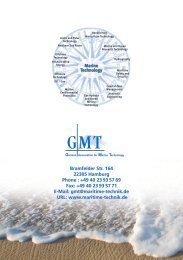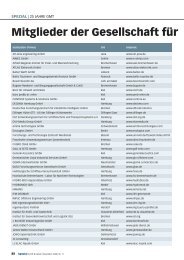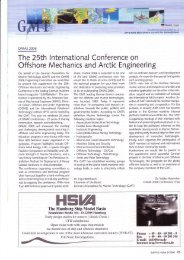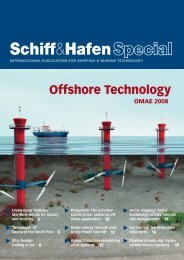Jahresbericht 2009 - Gesellschaft für Maritime Technik eV
Jahresbericht 2009 - Gesellschaft für Maritime Technik eV
Jahresbericht 2009 - Gesellschaft für Maritime Technik eV
Sie wollen auch ein ePaper? Erhöhen Sie die Reichweite Ihrer Titel.
YUMPU macht aus Druck-PDFs automatisch weboptimierte ePaper, die Google liebt.
Flottenkommando Fakten und Zahlen <strong>2009</strong><br />
Some 95% of the intercontinental goods exchange takes place by ship. In the EU-27 some<br />
90% of the goods volume in freight traffic from and to ports outside the EU is transported by<br />
sea. Shipping companies from the EU-27 countries operate 36.5% of the total world merchant<br />
fleet tonnage. Within the past couple of years world maritime trade has grown twice as fast as<br />
the worldwide GDP and thus has been one of the most dynamic growth markets. In this context<br />
sea transportation plays a central role in coping with the increase in international passenger and<br />
freight traffic.<br />
From an environmental point of view, shipping leaves the other traffic carrier far behind as<br />
regards energy expenditure per ton of freight. Furthermore, shipping contributes to relieving<br />
land-based traffic carriers. For this reason, short-haul maritime traffic and port expansion<br />
projects are given high political priority at national and European level.<br />
The North and the Baltic Sea (almost 3,400 km of German coastline – Baltic Sea: 2,100 km /<br />
North Sea: 1,300 km) are among the most frequented waters in the world. In this region the Kiel<br />
Canal is of particular economic significance. It is a particularly important international waterway<br />
between the two seas. With 33,078 ships passing through, it is almost as heavily used as the<br />
Panama Canal (13,147) and the Suez Canal (21,415) taken together. However, the freight volume<br />
of 99.3 million tons transiting the Kiel Canal is of minor importance as compared to the two<br />
large canals. Panama Canal: 209.7 million tons and Suez Canal: 723 million tons.<br />
In the North Sea, vessel traffic between some of the major European ports such as<br />
Rotterdam, Hamburg, Bremerhaven and Antwerp is most important. Competitiveness of the<br />
German ports shall be considerably strengthened upon completion of the new deep water port<br />
in Wilhelmshaven (JadeWeserPort). But also completion of the CT4 in Bremerhaven has<br />
significantly improved the competitive conditions for this location.<br />
The sea as a habitat and transport medium is considered an economic area with vast<br />
perspectives and development opportunities that is to be preserved in a sustainable manner. At<br />
the same time the use of the seas at a sustainable level must be ensured to avoid endangerment<br />
of the seas’ natural functions and their significance as food resource. Furthermore, cooperation<br />
of the international community will become increasingly important against the background of<br />
the growing threat posed by piracy. In this context, sustainable concepts must be developed,<br />
above all at the African coasts, especially in Somalia.<br />
1.6.2 German Merchant Fleet<br />
An adequate national merchant fleet is the basis for representing our maritime political<br />
interests at an international level. It is the decisive prerequisite for being accepted as a seafaring<br />
nation. Only this way can Germany effectively contribute to international maritime politics as a<br />
maritime nation and shipping center of international significance and thus enforce new<br />
conditions for ship security, marine protection and international market regulations for maritime<br />
transport and fishing.<br />
Moreover, having own transport capabilities in sufficient numbers, reduces dependence on<br />
foreign carriers in times of crisis or conflict. For the sectors of shipbuilding and marine<br />
technology, the German merchant fleet and even more so the German Navy rely on a powerful,<br />
innovative local maritime industry that is also internationally competitive and able to cooperate.<br />
To this end, adequate industrial capacities and technological know-how must be maintained and<br />
adapted to any developments, if required.<br />
The increase in world trade and the extension of German trade relations in international<br />
merchandise traffic drive up demand for shipping services. In recent years the Pacific region has<br />
increasingly gained in economic significance, mainly through the above-average growth of the<br />
Chinese economy. This trend is particularly beneficial for German merchant shipping as it is not<br />
only involved in Germany’s direct maritime trade with other countries but also participates in socalled<br />
cross-trade with third states.<br />
At least three quarters of Germany’s merchant shipping tonnage is involved in cross-trade,<br />
which thus plays a much more significant role than the transport of goods from and to Germany.<br />
Commercial relations between Europe and Asia via the two large German sea ports are one of<br />
the greatest trade routes of all, which becomes particularly obvious when looking at the increase<br />
in transport capacity.<br />
1 - 19


